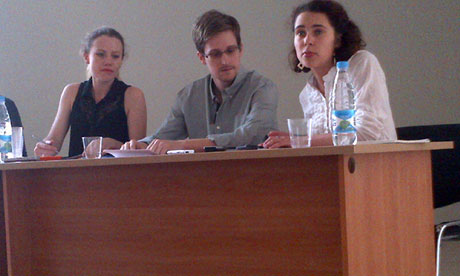 |
| T-shirt purchase supports coverage of Manning's trial. Purchase it here. |
"the networked Fourth Estate, the set of practices, organizing models technologies, that together come to fill the role that in the 20th Century we associated with the free press. Essentially, the cluster...of the Fourth Estate is the way in which the press provides a public check on the three classes of branches of government. The networked Fourth Estate is essentially the cluster of practices and technologies and organizations that fill that role in the 21st model of network information production.”Kevin Gosztola's fine reporting on the trial via the blog Firedoglake went on to quote this exchange between Judge Lind and Prof. Benkler:
LIND: Am I understanding you correctly in saying that you're basically looking at, you know, in the last century traditional new media and the way people got news was through newspapers. Before that, I don't know, a telegram or something like that or a cable. As technology evolved, now you're getting more people on the internet that are sharing things?
BENKLER: That's at the core of it.This relates to what has become a perennial topic of conversation among activists and organizers everywhere, especially since Obama took office: What's with the widespread apathy in the face of climate crisis, endless war, and the burgeoning police state?
 |
| Photo credit: Tanya Lokshina of Human Rights Watch / Edward Snowden and human rights activists meeting July 12, 2013 at the transit center of a Moscow airport where whistleblower Snowden awaits safe passage to asylum in a yet to be determined South American nation. |
In an article this week in Common Dreams Richard Eskow asked "Where the hell is the outrage?" citing the disintegration of anything resembling the middle class "American dream" amid widespread apathy on the part of those affected.
The dearth of real information that results from believing that NPR, the New York Times, the Washington Post, the New Yorker, and "the Journal" (i.e. WSJ) are providing all the news that's fit to print is invisible -- but deadly. You might as well watch only ESPN and feel that you were well-informed (as many, in fact, do).
 |
| Photo credit: http://briansphirstblog.blogspot.com/2012/03/sticking-with-it.html |
Social networking sites are shunned for various reasons. One is because they enable much of the NSA's surveillance of citizens. Venezuela's Prisons Minister Iris Varela was reported as tweeting this week:
Comrades: cancel your Facebook accounts, you've been working for free as CIA informants. Review the Edmund Snowden case!Another may be generational. Baby boomers just aren't netizens; many don't feel comfortable using their social networks to gather, filter and analyze information. They don't learn to tweet, and they use facebook for connecting with childhood classmates, and sharing cute pix of the grandkids. Never mind tumblr, vine, reddit, and so on ad nauseum. Too strange, and too overwhelming.
My hunch, though, is that the biggest reason is: if you know about gigantic problems like the U.S./NATO military-industrial-educational-security complex, you'll have to do something about it.
I was part of a panel at the University of Southern Maine last night about the constitutional dangers of the surveillance state. Rachel Myers Healy of the ACLU shared the three-pronged attack on the monitoring of calls by the NSA in cooperation with the telecom giant Verizon, and one thing I learned from her remarks is that attorney-client communications are not privileged or private. Verizon users mounting an effective defense against prosecution by the U.S. government under these conditions is likely to be difficult.
A member of the audience suggested that corporate espionage for commercial gains was likely a major goal of the sweeping NSA surveillance revealed by whistleblower Edward Snowden, unfolding as we speak. Another presenter, Eric Hooglund, reminded us that only eight members of Congress were informed of the existence of the secret FISA court that supposedly oversees (but really just rubber stamps) government surveillance. Reminder to self: find out the names and twitter usernames of those eight people.
A final question from the audience at my event: if we could do only one thing to resist drone enabled and other forms of surveillance in Maine, what would that thing be?
My answer: be an information worker. My role on the panel was sharing examples (e.g. video here and photos here) of the beautiful resistance to life under drones.
In my small way, I am a willing receiver and contributor in the networked fourth estate. I will use the Internet, my monitored Gmail account, my surveilled Facebook pages, and my twitter and tumblr accounts, until the day they shut them down.
Now, I'm off to feed my carrier pigeons...

No comments:
Post a Comment